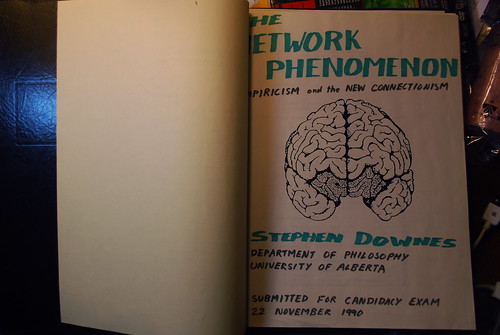OLDaily
by Stephen Downes
March 24, 2009
TNP: 20 Years On
I have just finished retyping and uploading a long paper called The Network Phenomenon I wrote as my PhD dissertation proposal almost 20 years ago. As most readers know, I never did receive my PhD for any of this work. In this post, I talk about my proposal, what led to it, what happened to it, and the influence this work has on my life today.
The Network Phenomenon: Empiricism and the New Connectionism
Stephen Downes, 1990
(The whole document in MS-Word)

1. Introduction
2. Empiricism
3. The Objections to Empiricism
4. Connectionism
5. Distributed Representations
6. The Problems of Perception
7. Associationism: Cognitive Structures
8. Associationism: Inferential Structures
9. Connectionism and Justification
10. Summary
11. Projects and Investigations
TNP: 20 Years On
Stephen Downes,
Half An Hour,
March 24, 2009 [Link] [Tags: none]
[Comment]
Ada Lovelace Day
 Ada Lovelace (according to Wikipedia) "is today appreciated as the 'first programmer' since she was writing programs-that is, manipulating symbols according to rules-for a machine that Babbage had not yet built. She also foresaw the capability of computers to go beyond mere calculating or number-crunching while others, including Babbage himself, focused only on these capabilities." Ada Lovelace Day was created by Suw Charman-Anderson to "to draw attention to women excelling in technology" by publishing a post on Mach 24 - today - about a woman in technology they admire. The purpose is to highlight role models for young women in the field.
Ada Lovelace (according to Wikipedia) "is today appreciated as the 'first programmer' since she was writing programs-that is, manipulating symbols according to rules-for a machine that Babbage had not yet built. She also foresaw the capability of computers to go beyond mere calculating or number-crunching while others, including Babbage himself, focused only on these capabilities." Ada Lovelace Day was created by Suw Charman-Anderson to "to draw attention to women excelling in technology" by publishing a post on Mach 24 - today - about a woman in technology they admire. The purpose is to highlight role models for young women in the field.
I won't pick someone specific, but rather, will highlight those in my own network who are celebrating today:
- TED Blog highlights Brenda Laurel, Mena Trott, and Aimee Mullins
- David Weinberger picks Wendy Seltzer
- Jim Groom picks Ms. Pacman
- George Roberts names a whole list
- Leisa Reicht highlights Rachel Dixon
- Alja Sulcic picks several people and her mom
- Paul Walk nominates Pattie Maes
- Karyn Romeis names Randice-Lisa Altschul
- Juliette Culver picks Angela Byron
- Kerryj names Joanna McKay
- Emma Duke-Williams talks about Mary Lou Jepsen
- Alfred Thompson names Thelma Thompson, his wife
- Sheila MacNeill picks Lorna Campbell
- Luis Suarez identifies Gina Poole
- Lexa highlights Sally Buberman
- Lucie deLaBruere does a Friday Five on "the leading women in tech"
Suw Charman-Anderson,
Finding Ada,
March 24, 2009 [Link] [Tags: Wikipedia, Networks, Books, Online Learning, Web Logs]
[Comment]
Social Network Analysis and Leadership Networks
The focus on 'leadership' networks bothers me, because networks are used by everyone, not just leaders. But this quibble set aside, I found this paper to be interesting and engaging. Following a typology of some different types of networks (peer, organizational, field-policy, collective) the authors offer an extended discussion regarding the evaluation of these networks. The conclusion - that there are no standards for evaluation - emerges easily, but the issues touched along the way are fascinating. For example, the authors show how network diagrams can mislead people (see especially the work on network equivalence and network density). And some criteria for connecting people - 'works with', 'friends' - might be vacuous. An excellent paper overall. Via Bruce Hoppe.
Bruce Hoppe and Claire Reinelt,
Website,
March 24, 2009 [Link] [Tags: Leadership, Networks]
[Comment]
Share Best Practices - Patterns

The thing about "best practices", I think, is that it is so badly named. It implies that there is one things which is, well, "best" - something everyone knows (or should know) to be false - "What works in my marriage won't necessarily work in -- and may even damage -- yours." Tony Karrer's approach is much preferable. We begin by recognizing that "Studies of health workers, executives, military, firefighters, pilots and others have found that sense making, pattern recognition and mental models are essential components of decision making." Then "through pattern recognition, the problem solver identifies actions to address the issue. As one begins to act, they are also assessing, in real time, the potential impact of their actions.... As problem solvers do this, they adjust their actions on-the-fly." Instead of thinking "best practices", think "better patterns".
Tony Karrer,
eLearning Technology,
March 24, 2009 [Link] [Tags: Online Learning]
[Comment]
Connect Is Moving ...
Don't know why, but for some reason EDUCAUSE is collapsing their Connect blog website into the main EDUCAUSE website. Connect was pretty much the best part of the EDUCAUSE website; I don't know why they're wrecking it.
Matt Pasiewicz,
EDUCAUSE Connect,
March 24, 2009 [Link] [Tags: Web Logs, EDUCAUSE]
[Comment]
This newsletter is sent only at the request of subscribers. If you would like to unsubscribe,
Click here.
Know a friend who might enjoy this newsletter? Feel free to forward OLDaily to your colleagues. If you received this issue from a friend and would like a free subscription of your own,
you can join our mailing list. Click here to subscribe.
Copyright 2008 Stephen Downes
Contact: stephen@downes.ca
This work is licensed under a
Creative Commons License.